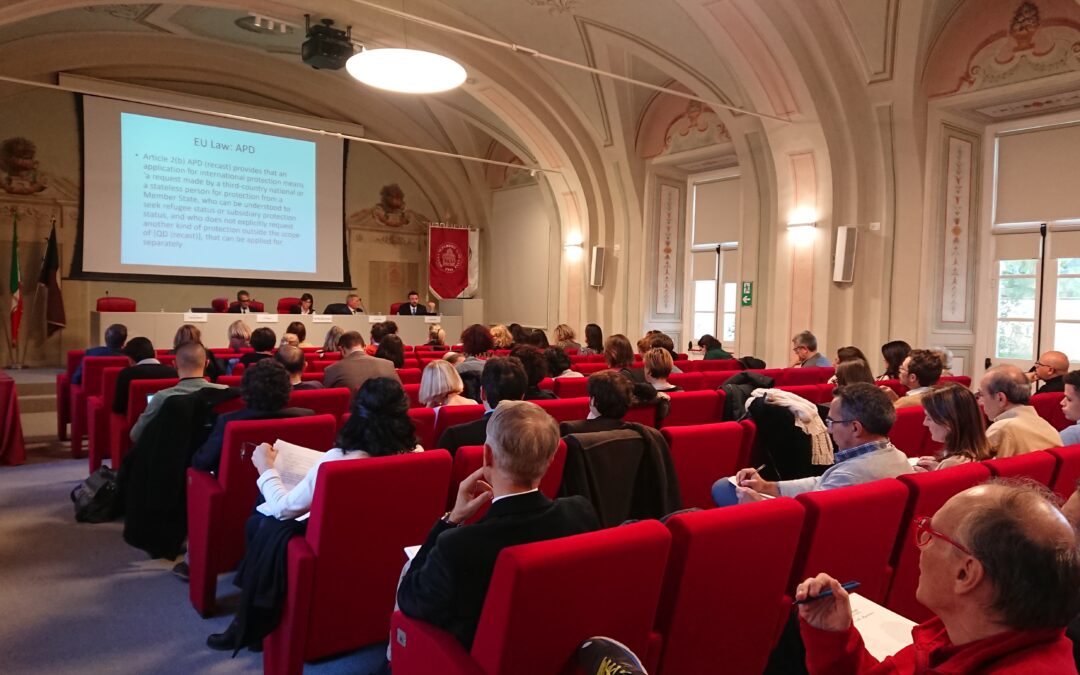
Dec 3, 2019 | Agendas, Events, News
Today, the ICJ together with Scuola Universitaria Sant’Anna and Scuola Superiore de la Magistratura hold a training seminar on access to the asylum procedure and the right to an effective remedy in Pisa, Italy.
The training seminar brings together 65 Italian judges and lawyers specialized in access to international protection. During the two days of training, experts from the CJEU, Italian judiciary and academics, UNHCR and ICJ will deliver the training, bringing international human rights and EU law perspectives to the discussion on Italian law and practice.
Among the issues discussed during the training seminar will be access to the asylum procedure in international and EU law, access to the asylum procedure and accelerated procedures in light of the right to an effective remedy, appeal, legal assistance and legal aid, and interpretation. Further issues including the burden of proof in international protection cases and duties of cooperation with the asylum authority will be examined from the perspectives of judges, of territorial Commissions and lawyers as well as from the international and EU law perspective. Finally, working groups on burden of proof, credibility assessment of asylum seekers and countries of origin of asylum seekers will take place.
See the full agenda here.
This training is a part of FAIR PLUS project. It was carried out with the financial support of the European Union. Its contents are the sole responsibility of ICJ and do not necessarily reflect the views of the European Union.
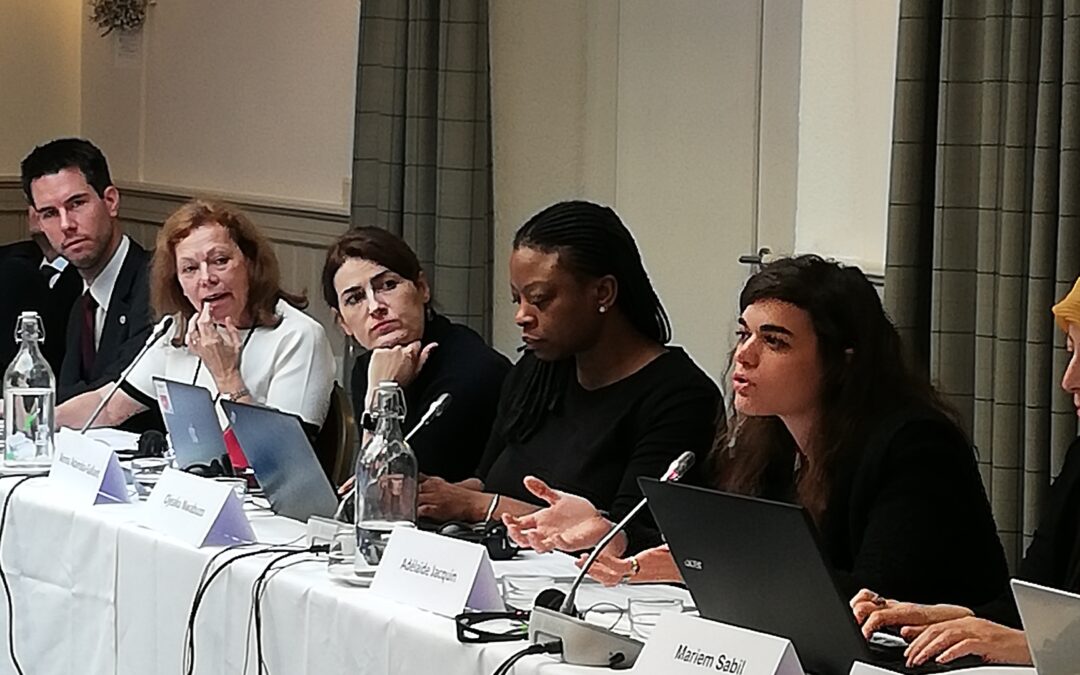
Nov 29, 2019 | Agendas, Events, News
Today, in Brussels, the ICJ held a roundtable discussion on the impact of counter-terrorism laws on specific groups, including children, and ethnic and religious groups.
The roundtable brought together 34 judges, lawyers, NGOs and other experts from countries including Germany, France, Italy, the Netherlands, Poland, Belgium, Portugal, Romania, and Spain to discuss how the rights of children and of ethnic and religious minorities can be best protected in applying counter-terrorism legislation in the courts, especially in light of the EU Directive 2017/541 on Combatting Terrorism.
This was the last of four roundtables held by the ICJ and its partner organizations between April and November 2019 in the framework of the EU funded project “Judges Uniting to Stop Terrorism with International, Constitutional and European law (JUSTICE).”
The discussion in the first session of the roundtable addressed the disproportionate impact of counterterrorism laws on ethnic and religious groups. It focused on compliance with the principle of non-discrimination, through safeguards in legislation, in the judicial application of counter-terrorism laws, and in investigation and evidence gathering.
The second session of the roundtable addressed the particular impact of counter-terrorism legislation on children, including the challenges involved in protecting the human rights of children of “foreign fighters” and ensuring the primacy of their best interests in decisions on their return to EU countries. Participants also discussed protection of the human rights of returned children of “foreign fighters” both as victims of terrorism and where they are accused of crimes of terrorism.
See the agenda here.
This workshop was carried out with the financial support of the European Union and the Open Society Foundations. Its contents are the sole responsibility of ICJ and do not necessarily reflect the views of the European Union or the Open Society Foundations.

Nov 28, 2019 | Events, News
Today, the ICJ, together with the Constitutional Chamber of the Supreme Court of Kyrgyzstan, OHCHR and UNODC are holding a meeting of judges from Central Asia to discuss international law and standards in the field of extradition, expulsion, the rule of law and human rights.
The workshop aims to facilitate exchange of experiences regarding the law and practice of extradition and expulsion in European and Central Asian countries. Presentations at the workshop will analyse international law and standards on effective criminal justice co-operation and the protection of human rights in extradition and expulsion, and their application in practice.
The workshop will present cases from national courts as well as from international mechanisms such as the European Court of Human Rights, the UN Committee against Torture and the UN Human Rights Committee.
The workshop is taking place in Bishkek (Kyrgyzstan) and is hosted by the Constitutional Chamber of the Supreme Court of Kyrgyzstan.
Judges from Kazakhstan and Uzbekistan are participating in the event that includes international experts from UNODC, ICJ, and Italian Judge Elena Masetti Zannini.
See the agenda of the day in English and in Russian.
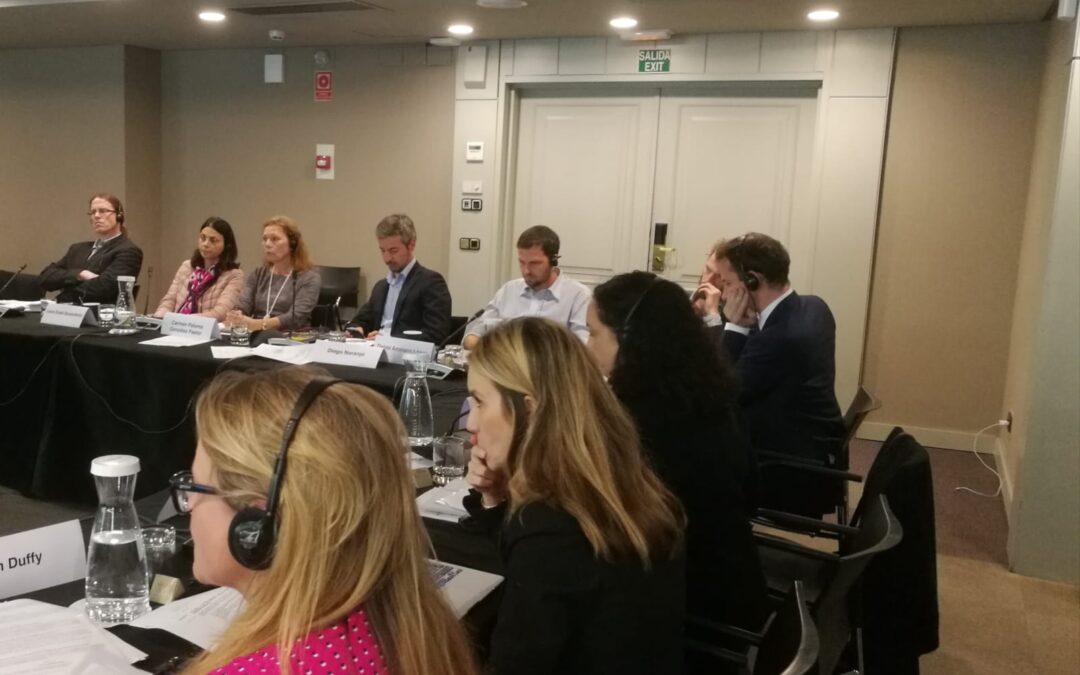
Oct 19, 2019 | Events, News
On 18 October, Scuola Superiore Sant’Anna, Juezas y Jueces para la Democracia and the ICJ held a a closed-door roundtable discussion in Madrid on the impact of the application of counter terrorism legislation on freedom of expression and association: implementing the EU Directive 2017/541 on combating terrorism.
The discussion took place in the framework of the EU funded project “Judges Uniting to Stop Terrorism with International, Constitutional and European law (JUSTICE) project”.
Judges, prosecutors and lawyers from 10 EU countries shared their practices and experiences in the implementation of the EU Directive 2017/541 on combating terrorism and the application of counter-terrorism legislation and its impact on freedom of expression and association, including humanitarian work within the different legal systems of the European Union (EU) Member States.
The discussion covered the offences of glorification of terrorism and apology for terrorism and its different implementation in various jurisdictions and how legal certainty and proportionality can be ensured. The roundtable further focused on the freedom of expression on-line and the impact of the application of counter-terrorism law on freedom of association and legitimate activities, including humanitarian assistance. These practices were be assessed in light of international human rights law principles in order to identify best practices that could be promoted throughout the EU.
This was a third out of four round-tables organized within this project between April and November 2019 by the ICJ and partners.
See the agenda here.
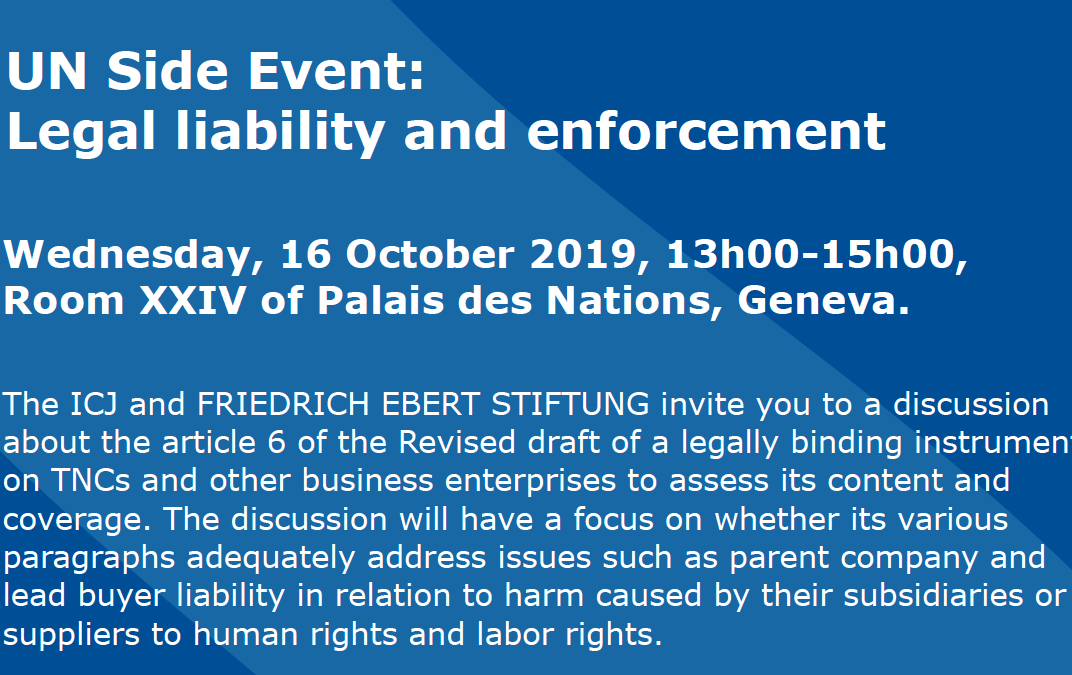
Oct 14, 2019 | Events, News
This side event will take place on Wednesday, 16 October 2019 at 13h00-15h00 in room XXIV of Palais des Nations, Geneva.
The ICJ and FRIEDRICH EBERT STIFTUNG invite you to a discussion about the article 6 of the Revised draft of a legally binding instrument on TNCs and other business enterprises to assess its content and coverage. The discussion will have a focus on whether its various paragraphs adequately address issues such as parent company and lead buyer liability in relation to harm caused by their subsidiaries or suppliers to human rights and labor rights.
The panel will feature:
- Doug Cassel (by video), University of Notre Dame
- Makbule Sahan, International Trade Union Confederation
- Markus Krajewski, Friedrich-Alexander-Universität Erlangen-Nürnberg
- Olivier de schutter, University of Louvain
Moderator
- Ian Seiderman, ICJ Legal and Policy Director
Side event Legal liability (flyer of the event, in PDF)
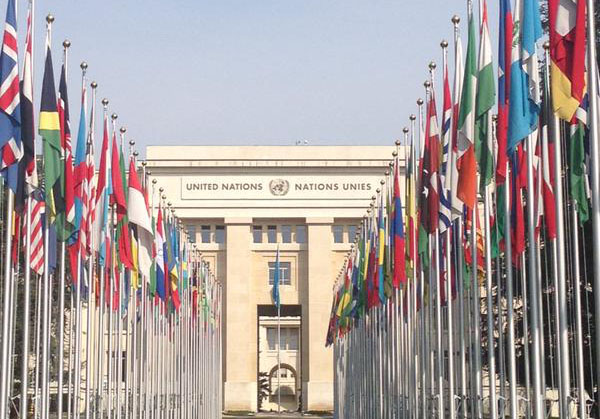
Oct 12, 2019 | Agendas, Events
Today begins in Izmir (Turkey) a one-day workshop for lawyers and CSO practitioners on the use and strategies of UN mechanisms and of their decisions in domestic courts.
This event is organized by ICJ, in cooperation with its partners Kapasite Geliştirme Derneği and Human Rights Joint Platform, as part a/the EU co-financed project Rebuilding and Ensuring Access to justice with civil society in Turkey.
30 lawyers and civil society practitioners are taking part in the workshop on 12 October in Izmir.
The workshop aims at discussing the functioning of the UN human rights mechiansms (treaty bodies and charter-based bodies) as well as their follow up procedures and the implementation of their decisions in the domestic legal framework in Turkey.
The workshop will provide presentations on the functioning of UN mechanisms by international expert, including from OHCHR, on the value of UN decisions under Turkish law, as well as discussions and brainstorming on how to use UN decisions in Turkey.
The project is funded by the European Instrument for Democracy and Human Rights (EIDHR) of the European Union.
Turkey-Workshop-Agenda-UNmechanisms-Izmir-2019-eng (download the agenda in English)
Turkey-Workshop-Agenda-UNmechanisms-Izmir-2019-tur (download the agenda in Turkish)










